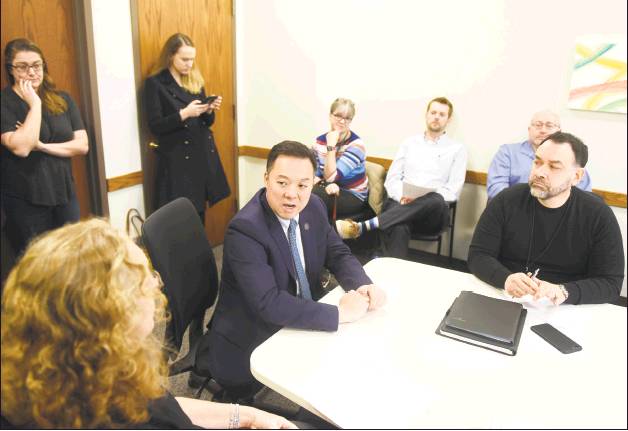Helping those with disabilities personal for Tong
Attorney general talks about sister with special needs at Greenwich Town Hall event
By Tatiana Flowers
GREENWICH — The Connecticut attorney general’s reason for appearing at a Greenwich meeting for people with disabilities Monday morning was twofold.
William Tong, in his role as attorney general, upholds the civil rights of people with special needs when they are discriminated against because of their disabilities.
But he also showed up to the Town Hall meeting with a personal interest.
“I am the brother of my eldest sister, who has cognitive and learning disabilities that have challenged her profoundly for all of her life,” Tong said.
“We grew up in a time when people didn’t understand the language” to describe issues affecting people with special needs, he said. “And programs were not well-developed, not well-publicized.”
Tong’s parents live in Glastonbury and he and his siblings grew up in West Hartford, two well-resourced communities, he said. His sister helped their parents run the family businesses while also engaging with members of both communities.
“But (she) was never able to access a program that gave her sustained independence,” Tong said.
“Trying to find a place for my sister Jill in this world ... has been a challenge, and we still confront that challenge every day as a family.”
Tong spoke to local social services providers, parents of children with special needs and other town workers during the meeting led by the First Selectman’s Advisory Committee for People with Disabilities. The group serves as a community resource in addressing accessibility and promoting equal rights and opportunities for people with special needs, according to the town website.
For decades, the committee has fought to make that population’s voice heard. Over the years, group leaders have maintained a common refrain.
“In a large part of this state, we find inaccessible buildings, we find inaccessible transportation, we find inaccessible websites for towns, and it’s a struggle,” said Alan Gunzburg, chairman of the committee.
“It’s a struggle from the standpoint that we would have thought by this point that we would have cleared the debts and created at least a physical pathway, so that the barriers to enter not only society, but the workforce, would have been removed,” Gunzburg said.
He mentioned David Tovar, a visually impaired Greenwich High School senior, who is three grade levels behind his peers because the school district often lacked the proper supports and materials to teach blind students.
A woman at the back of the room chimed in, offering another example of the struggles special needs students face.
“We know an 11th-grader who reads at a third-grade level in town, who has been passed through every level despite missing over half his days in class,” said Lindsey Fahey. “The town just pushes him through.”
Another group falling through the cracks are people who have cognitive issues but are not intellectually disabled, such as individuals with autism, said Michael Beloff, treasurer of Abilis, a Greenwich-based nonprofit that provides assistance to adults and children with developmental disabilities and their families.
“If you’re intellectually disabled, there is a service model to help those individuals through the DDS,” or Connecticut Department of Developmental Services, Beloff said.
“If you have mental health issues, there are services through DMHAS (or Department of Mental Health and Addiction Services). If you have cognitive issues, such that which causes you to be disabled under the law ... there is not a service model to help those individuals,” he said. “We do not have a service model because of how Connecticut has chosen to provide services to those with those issues.”
The group looked to Tong for answers.
In the upcoming legislative session, the Attorney General’s Office is seeking the authority to sue on behalf of Connecticut individuals who faced violations of their civil rights. Last year, the same piece of legislation was introduced but it did not pass in the Senate, said Tong, who lives in Stamford.
“We’re hopeful that this year it will get through both houses,” he said. “The governor has agreed to sign it.”
Such a move would help people with disabilities, who are falling through the cracks, especially those who can’t afford to pay attorney’s fees or others who can’t find trial lawyers willing to take their case, said Tong.
“There’s nobody to represent them and to sue on their behalf and vindicate their rights, and so the Attorney General’s Office is seeking that affirmative authority,” he said. “I don’t have to tell you how profound a change that would be.”
By the end of the meeting, many committee members had voiced support for the legislation, and asked Tong how they could help ensure the bill is passed.
Seeking support from First Selectman Fred Camillo, the Greenwich Legislative Delegation and the Connecticut Conference of Municipalities are a good start, Tong said. “It would be a huge help if they would get on board.”
After the meeting, committee leaders seemed satisfied with Tong’s message and understanding of issues affecting people with special needs.
“I think its was a spirited meeting with a lot of information,” said Gunzburg.
“The attorney general understands our plight and understands how difficult it is for people with disabilities to make sure that their civil rights are not being trampled on,” he said. “And we’re very happy to support him in every way, to help ensure that we continue to work toward full inclusion and accessibility.” tatiana.flowers@thehour.com

